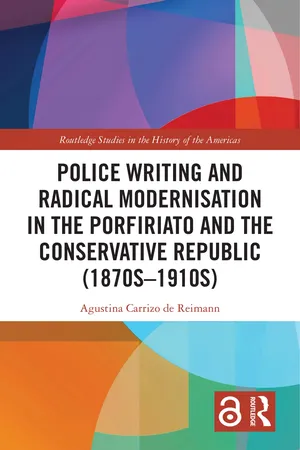
Police Writing and Radical Modernisation in the Porfiriato and the Conservative Republic (1870s-1910s)
- 234 pages
- English
- ePUB (mobile friendly)
- Only available on web
Police Writing and Radical Modernisation in the Porfiriato and the Conservative Republic (1870s-1910s)
About This Book
This book explores the process of modernisation during the Porfiriato and the Conservative republic from the perspective of one of its most erratic agents: the urban police.
Taking a pragmalinguistic approach, this book examines police bureaucratic, journalistic, and literary writing practices that flourished in the wake of police professionalisation and in response to the demands of state expansion, urban order, and cultural disciplining. It outlines the precarious state of an institution that had to redefine itself in the face of change, as well as policemen's attempts to enforce and imagine different modes of doing modern estate, society, and culture. Integrating classical sociological theories and perspectives from Latin American police studies with debates on republican modernity, this study argues for an understanding of fin-de-siècle modernisation as a process of radical transformation rather than a maladaptation to Western modernity or blunt heteronomy.
With its comparative approach and theoretically informed analysis, this book will appeal to scholars exploring police formation in Argentina and Mexico, seeking new insights into this key period of national organisation, and questioning the premises underlying the interpretation of modernity. The transdisciplinary approach will be of interest to researchers of writing cultures and postgraduate students wishing to engage critically with the sources of history.
Frequently asked questions
Table of contents
- Cover
- Half Title Page
- Series Page
- Title Page
- Copyright Page
- Dedication
- Table of Contents
- List of abbreviations
- List of figures
- Acknowledgements
- Introduction
- 1 Dis/Orders of Modernisation in the Porfiriato and the Conservative Republic
- 2 Escritura Mecánica. Police Bureaucratic Writing and the Reading State
- 3 Revistas de Policía. Police Journalistic Writing and the Modernised City
- 4 Escritura Policial de Afición. Police Literary Writing and the Fictions of Progress
- 5 Conclusion. Police Polygraphy and Radical Modernisation
- References
- Index